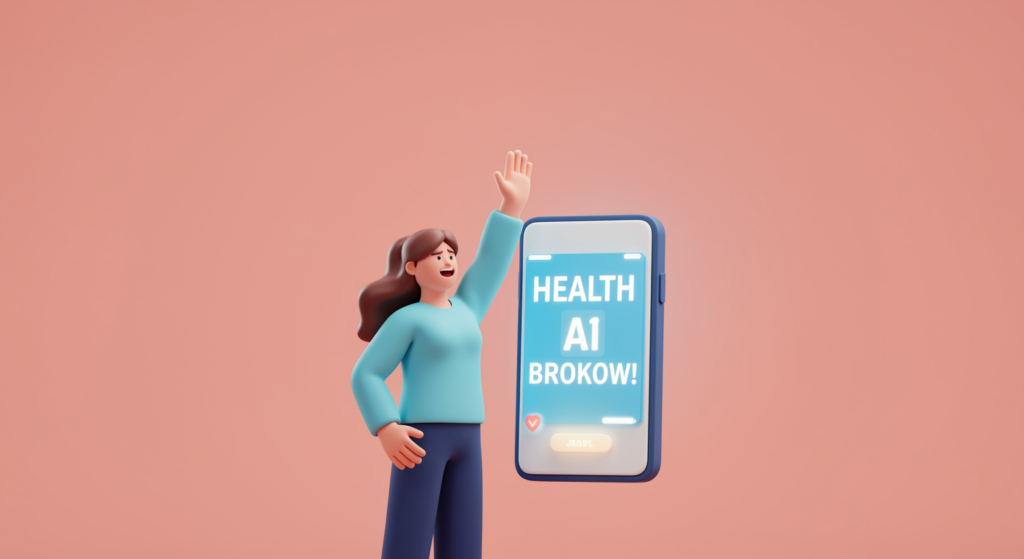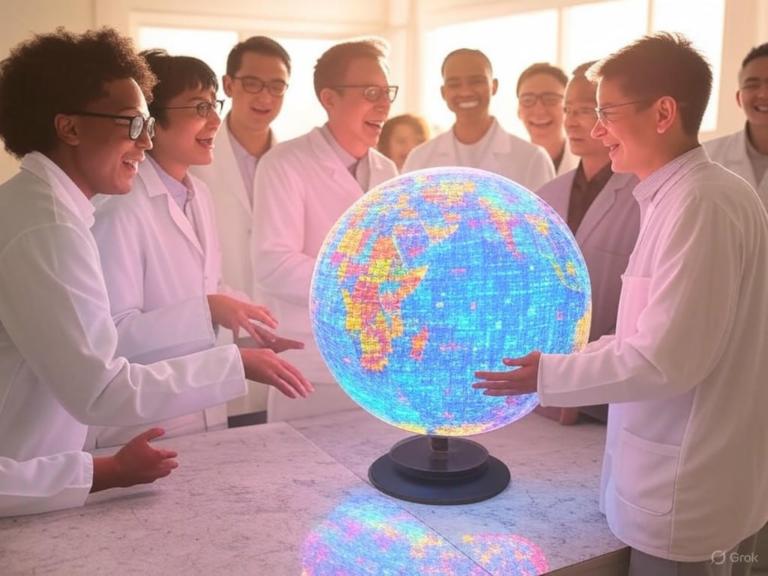
ChatGPT Life-Saving Story: Woman Credits AI for Survival
The Unexpected Hero: How AI Stepped in to Save Lives
In a world where technology often feels distant, the ChatGPT life-saving story has captured global attention, showing how artificial intelligence can intervene in critical moments. Two women in the United States turned to ChatGPT, OpenAI’s innovative chatbot, when traditional medical advice fell short, ultimately crediting it for alerting them to severe health risks. This emerging role of AI in healthcare isn’t just about convenience—it’s about catching what humans might miss, and these real-life tales prove its potential.
ChatGPT Life-Saving Story: The Journey of a Woman Battling Undiagnosed Cancer
From Persistent Symptoms to Medical Dead Ends
Imagine dealing with unexplained stiffness in your fingers for months, only to have doctors dismiss it as something routine like rheumatoid arthritis. That’s exactly what happened to Lauren Bannon, a 40-year-old mother of two, back in early 2024. As her symptoms escalated to include severe stomach pain and a startling 14-pound weight loss in just one month, physicians labeled it as acid reflux, leaving her frustrated and fearful.
Have you ever felt like your concerns weren’t being heard? Lauren’s experience highlights how easily symptoms can be overlooked, emphasizing the need for second opinions, even from unexpected sources.
Seeking Answers Through AI Assistance
Desperate for clarity, Lauren inputted her symptoms into ChatGPT, and the chatbot’s response pointed toward Hashimoto’s disease, an autoimmune condition affecting the thyroid. This ChatGPT life-saving story took a turn when Lauren advocated for targeted blood tests, despite her doctor’s doubts and the absence of family history. The results confirmed the AI’s suggestion, proving that technology can sometimes spot patterns that routine check-ups miss.
A Timely Diagnosis That Changed Everything
Thanks to that insight, further tests revealed two small lumps on her thyroid, leading to a cancer diagnosis in October 2024. Lauren’s quick action, inspired by ChatGPT, ensured she received prompt treatment and is now recovering. If you’re facing similar uncertainties, remember that tools like AI can complement professional care, potentially turning a ChatGPT life-saving story into your own.
Another ChatGPT Life-Saving Tale: Protecting a Mother and Her Unborn Child
A Simple Query That Sparked Alarm
What started as a casual question about minor jaw tightness turned into a life-or-death situation for Natallia Tarrien, an eight-months-pregnant photographer from Charlotte, North Carolina. When she asked ChatGPT for advice, the response was immediate and urgent: check your blood pressure right away. This moment marks another powerful ChatGPT life-saving story, where AI’s quick analysis prevented tragedy.
From AI Warning to Emergency Response
Natallia discovered her blood pressure was alarmingly high at 200/146, a level that demanded instant action. ChatGPT’s direct follow-up—”Call an ambulance now”—pushed her to seek help, even when she hesitated. In situations like this, AI serves as a 24/7 advisor, but always pair it with professional steps to ensure safety.
The Aftermath: A Narrow Escape and Widespread Awareness
Hospital staff acted swiftly, leading to an emergency delivery that saved both Natallia and her baby from the dangers of preeclampsia. Her story exploded online, with an Instagram post gaining over 34 million views, turning it into a viral ChatGPT life-saving narrative. Doctors later confirmed that ignoring the signs could have been fatal, underscoring how AI can bridge gaps in medical detection.
- This case shows AI’s ability to recognize emergency symptoms quickly.
- It also raises questions: Could more people benefit from using AI for health checks?
The Expanding Influence of AI in Health and Wellness
Can You Really Trust AI for Medical Insights?
While AI chatbots like ChatGPT aren’t meant to replace doctors, their role in the ChatGPT life-saving story illustrates how they can enhance health decisions. They excel at analyzing symptom patterns that might slip through the cracks, suggesting diagnoses for further exploration and urging immediate action in crises. For instance, AI can process vast amounts of data faster than a human, offering a fresh perspective on common issues.
But here’s a tip: Use AI as a starting point, not the final word. If you’re dealing with health worries, document your symptoms clearly before consulting it, then discuss the results with a professional.
Smart Ways to Leverage AI for Your Health
To make the most of AI without overstepping, follow these steps: First, gather detailed notes on your symptoms to get accurate suggestions. Second, treat AI’s input as a conversation starter with your doctor, not a diagnosis. Finally, never skip emergencies—call for help if needed, regardless of what AI says. These strategies can help you navigate health challenges more effectively, much like in the ChatGPT life-saving stories we’ve covered.
- Keep your queries specific to avoid vague responses.
- Verify AI advice with trusted medical sources.
- Share your AI findings during appointments for better outcomes.
AI’s Future in Revolutionizing Medical Diagnostics
As machine learning advances, AI like ChatGPT is becoming a key player in spotting rare conditions through data analysis. In the ChatGPT life-saving story, we see how it draws from medical literature to identify overlooked risks. Yet, challenges remain, such as ensuring AI accounts for personal health histories.
Balancing the Pros and Cons of AI Health Tools
Let’s weigh the benefits: AI offers rapid detection of unusual symptoms and is always available, making it a valuable ally. On the flip side, it might cause false alarms or lead to misinterpretations if not used carefully. Consider a hypothetical scenario: Someone uses AI for a minor ache and gets overly worried—balancing this requires education and caution.
| Advantage | Drawback |
|---|---|
| Quick identification of hidden health issues | Risk of inaccurate advice without context |
| Constant accessibility for advice | Potential for users to overlook professional input |
| Support in daily health monitoring | Limited ability to understand emotional factors |
Essential Lessons from These AI-Driven Miracles
- Trust your instincts: If symptoms persist, don’t hesitate to explore all options, including AI tools like in the ChatGPT life-saving story.
- AI can be a lifesaver by highlighting risks, but always seek expert confirmation.
- Blending technology with personal advocacy might just prevent a crisis—it’s about empowerment.
Wrapping Up: The Human-AI Health Alliance
The ChatGPT life-saving stories of Lauren and Natallia remind us that AI isn’t just a gadget—it’s a partner in health. By combining human intuition with AI’s analytical power, we’re entering an era where technology enhances our well-being. If you’re curious about how AI could play a role in your life, why not try it for non-emergency questions?
We’d love to hear your thoughts: Have you used AI for health advice? Share in the comments, spread this story, or check out more on AI innovations. Remember, your engagement helps us create content that matters.
References
- Fox News. “Woman says ChatGPT saved her life by helping detect cancer which doctors missed.” Link
- Hindustan Times. “Woman credits ChatGPT for saving her life after asking a question just for fun.” Link
- The Outpost. “ChatGPT aids in cancer detection: Woman credits AI for life-saving diagnosis.” Link
- Fox News. “AI newsletter: Woman says ChatGPT saved her life.” Link
- SheThePeople. “Woman credits ChatGPT for saving life.” Link
- ABP Live. “American woman says ChatGPT saved her and her baby’s life.” Link
ChatGPT life-saving story, AI medical advice, woman credits ChatGPT, AI saves lives, ChatGPT diagnosis, AI in healthcare, life-saving AI stories, ChatGPT health benefits, AI emergency advice, thyroid cancer detection







